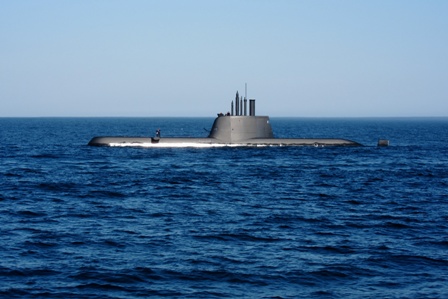 For the first time in 99 years of submarine existence in the Portuguese Navy, a national submarine will cross the North Atlantic.
For the first time in 99 years of submarine existence in the Portuguese Navy, a national submarine will cross the North Atlantic.
At the invitation of the US Navy, the NRP Tridente departs this Friday from the Lisbon Naval Base for a mission that will last about three months, with the objective of participating in the “War of 1812 – FleetEx” – air naval exercise that will take place at the east coast of the United States, off Norfolk, June 19-29, and which will feature more than twenty ships and aircraft from eight countries.
The high capacities of the new Portuguese submarines, namely the immersion autonomy and the large radius of action (in the order of 12 thousand miles), make this crossing possible for the first time.
The “War of 1812 – FleetEx” is a unique occasion for the Portuguese Navy and for the Submarine Squadron, which celebrates 99 years of existence this year.
With the participation of Portugal, USA, United Kingdom, Germany, Denmark, Norway, Canada and Brazil, the “War of 1812 – FleetEx” will allow the attainment of the indispensable levels of training of the garrison in the NRP Tridente and will allow the certification of the system of shipboard weapons.
The exercise is part of the commemorations of the bicentennial of the War of 1812, also known as the Anglo-American War, which pitted troops from the United States of America against those of the British Empire, and which lasted until 1815.
The NRP Tridente is commanded by Lieutenant Captain Amaral Henriques and its garrison consists of 33 soldiers (7 officers, 12 sergeants and 14 soldiers).
deterrence as a weapon
Controlling a vast maritime area of interest, such as the Portuguese one – with more than 4 million square kilometers, equivalent to 80% of the entire European continent – is always a complex task for any Navy, no matter how much resources it has. at your disposal.
The territorial discontinuity and the need to operate at a long distance from its bases, in a wide inter-territorial space, obliges Portugal to maintain a Navy with an eminently oceanic character.
Given the size of this maritime area and limited resources, deterrence is the only effective control strategy that remains for Portugal, given the impossibility of permanently monitoring, or with the necessary frequency, the entire national maritime space. Inhibiting potential opponents or offenders from proceeding in a certain course of action, playing with the degree of uncertainty that they may be being watched and that they will suffer irreparable losses, is, therefore, the basis of this strategy.
With an important role in the surveillance and repression of illegalities and abuses, surface and air means can, however, be easily located and followed by current detection systems (satellite, radar, electro-optical and visual), which is why they do not exponentially the said deterrent factor.
By acting covertly, submarines are the only means capable of causing inhibition in potential opponents or offenders. Added to this are the unique characteristics of these naval assets, namely, their wide range of action and mobility, the ability to remain for long periods in an area of operations and the sophistication of their systems (sensors, weapons and command, control and communications systems ).
The possibility of blatantly surprising offenders or adversaries constitutes a nuclear and multiplier element of the deterrent strategy. Thus, only submarines are capable of monitoring, controlling and following offenders and opponents in a completely discreet way and without disturbing their modes of action and behavior, in order to collect unique evidence and/or information with high strategic value for the Portuguese State. .
From a purely military perspective, submarines are the only means capable of operating in areas completely dominated by the opponent, and can quickly destroy the core of their naval forces, attacking their bases on the coast and on land by surprise (up to about 130 km to the interior) and undermining ports and access areas considered to be neuralgic.
Although limited by political and military issues, the mere potential to carry out this panoply of actions gives a small country like Portugal an extraordinary capacity for assertion, thus constituting a strong argument in support of the State's foreign policy at any time of crisis that endangers the vital interests of the country.


















Comments